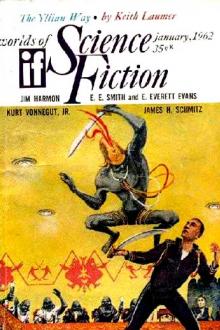Bat Wing, Sax Rohmer [top 20 books to read .txt] 📗

- Author: Sax Rohmer
Book online «Bat Wing, Sax Rohmer [top 20 books to read .txt] 📗». Author Sax Rohmer
“My father found he must go to Cuba to make arrangements for the future. Of course, our life there was finished. Ah Tsong stayed with me. You have heard how it used to be in those islands in the old days, but now you think it is so different? I used to think it was different, too. On the first night my father was away, Ah Tsong, who had gone out, was so long returning I became afraid. Then a strange negro came with news that he had been taken ill with cholera, and was lying at a place not far from the house. I forgot my fears and hurried off with this man. Ah!”
She laughed wildly.
“I did not know I should never return, and I did not know I should never see my father again. To you this must seem all wild and strange, because there is a law in England. There is a law in Cuba, too, but in some of those little islands the only law is the law of the strongest.”
She raised her hands to her face and there was silence for a while.
“Of course it was a trap,” she presently continued. “I was taken to an island called El Manas which belonged to Senor Menendez, and where he had a house. This he could do, but”—she threw back her head proudly—“my spirit he could not break. Lots and lots of money would be mine, and estates of my own; but one thing about him I must tell: he never showed me violence. For one, two, three weeks I stayed a prisoner in his house. All the servants were faithful to him and I could not find a friend among them. Although quite innocent, I was ruined. Do you know?”
She raised her eyes pathetically to Val Beverley.
“I thought my heart was broken, for something told me my father was dead. This was true.”
“What!” I exclaimed. “You don’t mean—”
“I don’t know, I don’t know,” she answered, brokenly. “He died on his way to Havana. They said it was an accident. Well—at last, Señor Menendez offered me marriage. I thought if I agreed it would give me my freedom, and I could run away and find Ah Tsong.”
She paused, and a flush coloured her delicate face and faded again, leaving it very pale.
“We were married in the house, by a Spanish priest. Oh”—she raised her hands pathetically—“do you know what a woman is like? My spirit was not broken still, but crushed. I had now nothing but kindness and gifts. I might never have known, but Senor Menendez, who thought”—she smiled sadly—“I was beautiful, took me to Cuba, where he had a great house. Please remember, please,” she pleaded, “before you judge of me, that I was so young and had never known love, except the love of my father. I did not even dream, then, his death was not an accident.
“I was proud of my jewels and fine dresses. But I began to notice that Juan did not present any of his friends to me. We went about, but to strange places, never to visit people of his own kind, and none came to visit us. Then one night I heard someone on the balcony of my room. I was so frightened I could not cry out. It was good I was like that, for the curtain was pulled open and Ah Tsong came in.”
She clutched convulsively at the arms of her chair.
“He told me!” she said in a very low voice.
Then, looking up pitifully:
“Do you know?” she asked in her quaint way. “It was a mock marriage. He had done it and thought no shame, because it was so with my mother. Oh!”
Her beautiful eyes flashed, and for the first time since I had met Ysola Camber I saw the real Spanish spirit of the woman leap to life.
“He did not know me. Perhaps I did not know myself. That night, with no money, without a ring, a piece of lace, a peseta, anything that had belonged to him, I went with Ah Tsong. We made our way to a half-sister of my father’s who lived in Puerto Principe, and at first—she would not have me. I was talked about, she said, in all the islands. She told me of my poor father. She told me I had dragged the name of de Valera in the dirt. At last I made her understand—that what everyone else had known, I had never even dreamed of.”
She looked up wistfully, as if thinking that we might doubt her.
“Do you know?” she whispered.
“I know—oh! I know!” said Val Beverley. I loved her for the sympathy in her voice and in her eyes. “It is very, very brave of you to tell us this, Mrs. Camber.”
“Yes? Do you think so?” asked the girl, simply. “What does it matter if it can help Colin?
“This aunt of mine,” she presently continued, “was a poor woman, and it was while I was hiding in her house—because spies of Senor Menendez were searching for me—that I met—my husband. He was studying in Cuba the strange things he writes about, you see. And before I knew what had happened—I found I loved him more than all else in the world. It is so wonderful, that feeling,” she said, looking across at Val Beverley. “Do you know?”
The girl flushed deeply, and lowered her eyes, but made no reply.
“Because you are a woman, too, you will perhaps understand,” she resumed. “I did not tell him. I did not dare to tell him at first. I was so madly happy I had no courage to speak. But when”—her voice sank lower and lower—“he asked me to marry him, I told him. Nothing he could ever do would change my love for him now, because he forgave me and made me his wife.”
I feared that at last she was going to break down, for her voice became very tremulous and tears leapt again into her eyes. She conquered her emotion, however, and went on:
“We crossed over to the States, and Colin’s family who had heard of his marriage—some friend of Señor Menendez had told them—would not know us. It meant that Colin, who would have been a rich man, was very poor. It made no difference. He was splendid. And I was so happy it was all like a dream. He made me forget I was to blame for his troubles. Then we were in Washington—and I saw Señor Menendez in the hotel!
“Oh, my heart stopped beating. For me it seemed like the end of everything. I knew, I knew, he was following me. But he had not seen me, and without telling Colin the reason, I made him leave Washington, He was glad to go. Wherever we went, in America, they seemed to find out about my mother. I got to hate them, hate them all. We came to England, and Colin heard about this house, and we took it.
“At last we were really happy. No one knew us. Because we were strange, and because of Ah Tsong, they looked at us very funny and kept away, but we did not care. Then Sir James Appleton sold Cray’s Folly.”
She looked up quickly.





Comments (0)